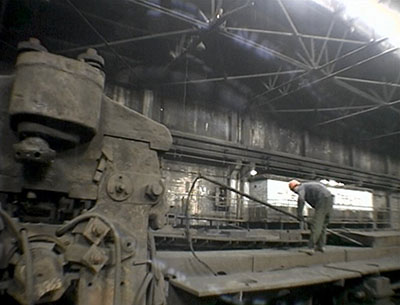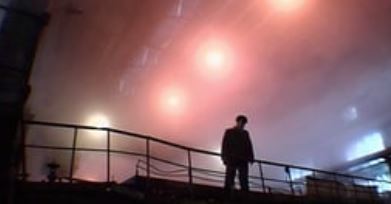
Wang Bang’s West of the Tracks (Tie Xi Qu) is a colossus of Chinese documentary. It is a titan of foreign film. It is a fantastic epic of a movie. And I loved it.
The film is actually a collection of three films – totaling a viewing time of over nine hours! The three films tell a story of China’s state-controlled heavy industrial processing facilities on the wane before the start of more privatization and free-market capitalism. It is a sad, bleak, depressing sort of mood. Filming was done in the dead of winter which only added to the harshness of the situation.
The film shows these huge complexes in Tie Xi, the industrial zone in Shenyang city, Liao Ning, China that must have employed millions of workers at one time. Now there are only a few workers here and there in these massive, cold buildings. It’s the slow death of this manufacturing center. Workers are caught up in the decline. They feel unprepared for losing their jobs without their promised government pension. They are trying to make the best of a very bad situation, but they are pawns in the transition to a new global manufacturing system.
The movie portrays the workers in a very sympathetic light. The viewer feels caught up in their miserable plight. Scrounging for building material or scraping by selling manufacturing scraps and possibly stolen coal, the laborers resort to any means necessary to survive. Shouldn’t the government be taking care of these workers that were once part of the grand and glorious communist plan? It feels like the workers were exploited and forgotten as the government industrial complex profited financially from maintaining socially harmful and destructive systems.
Although the film runs nine hours, it actually feels like it has to run that long. There is so much great material in the movie – and it’s on this huge industrial scale. I watched it on my laptop, but I think it would have made even more of an impact on the big screen. Gigantic, rusting machines and massive, almost dead factories and slow steel trains and dilapidated facilities all create a scene of ruin and decline. It is the end of China’s government control of manufacturing.
The Chinese documentary film is made of three movies: Rust, Remnants and Rails.

Rust
Rust opens the epic with the long, slow train shots. It gives us a feeling for how this film will be shot – like a camera on the wall just documenting what is happening. You get the feeling that it is all indeed real, nothing is staged or maneuvered or manipulated for the camera. For the first time we see the enormous industrial facilities covered in snow. A skeleton crew of unhealthy workers man the factory that probably once employed tens of thousands. They toil in hazardous conditions and produce a fraction of what they once did. The workers are being treated for lead poisoning while additional toxins gather around them. They worry about losing their jobs and pensions. It’s clear that neither factory nor worker has much of a future. The workers trusted the government system, but it turns out to be misplaced trust.
Remnants
In Remnants, the factory is scheduled to be closed. The community beside it (called “Rainbow Row”) will be bulldozed to the ground. The displaced workers will soon lose their homes, so they scavenge their own houses for material to sell. We get an understanding of how these people live their lives in this wasteland. There is no thought to education as a way out of this situation. Instead, some turn to crime. There is some discussion of formal payment for resettlement, but now no one totally trusts the government. Some residents resist and refuse to leave. They stubbornly stay in the area, living in a state of extreme poverty without electricity. It’s the only home they have ever known, and they feel they deserve better than being shuffled around like worthless rubbish. But they are against a massive force – the “tide of progress.”
Rails
Finally in Rails, the focus is on two individuals – Old Du and his son Du Yang. Old Du has a bit of a side hustle hoarding coal as he works for the railroad. The going is tough in every way for these two, but they just keep at it the best that they can, never giving up to take another path. Old Du gets thrown in jail, but his son stays heroically vigilant in a dark room lit by a solitary candle. It is all he can do to keep it together when his world is collapsing around him. The film is real and moving as workers lose their jobs, their homes and their friends.
Nine hours is a long time to watch a film – but it needs to be this long. It needs this much time to capture the full stories and lives of the laborers. The filmmaker might be accused of manipulative editing if it was trimmed to a two or three hour movie. I caught it in bits and pieces, probably over ten viewings. But I was disappointed when it was over. Even though it wasn’t exactly “entertaining,” I learned much about this particular period from the perspective of the camera on the wall. This Chinese documentary really captured a difficult but incredibly interesting time and place and people in China’s history. The mood and texture of the film totally overwhelmed me – the stark bleakness, resignation and utter hopelessness. How would these people survive? Weren’t they the heroes of the golden age of communism – starring in propaganda films with strong, loud rhythms of clanking molten steel on steel and unceasing production and manufacturing? How could the decline come so rapidly and completely? The movies never transition to the new economy, but clearly many people were sacrificed as the cost of progress.
West of the Tracks was highly acclaimed and won several international film awards including the Grand Prize, International Documentary Festival, Marseille, 2003, the Grand Prize, Festival du Film, Yamagata, 2003, the Grand Prize, International Documentary Festival, Lisbon, 2002, the Berlin International Film Festival, 2002 and the Montgolfiere d’Or Juried Prize for Documentary.
West of the Tracks costs $1,095 on Documentary Educational Resources or you can watch it for FREE on YouTube.
And stay curious.
If you are interested in other Chinese Documentaries, we recommend Last Train Home on this page.